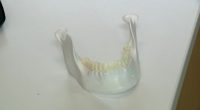Share this @internewscast.com
It was late 2023 and my eldest daughter, Aiyoung, was juggling part-time shifts on the deli counter at our local Waitrose with plans for her gap-year adventure in southeast Asia.
Having recently finished her A-levels, she was 18 and enjoying a new sense of freedom, darting around London to concerts with her gaggle of friends or spending time at the local farm where she volunteered.
But on November 4 she developed a tummy bug. By November 6 my healthy, vivacious, energetic teenager was gone.
And, close to two years on from her death, we are still bewildered and struggling to find out what happened.
I woke up at 2am that morning to the sound of an almighty crash in the bathroom. Aiyoung had attempted to use the toilet but collapsed. I rushed in to her, as did her younger sister, then 15.
We found Aiyoung on the floor, open-eyed yet completely unresponsive. Paramedics arrived quickly and tried to revive her, but I’d later learn she’d suffered several cardiac arrests, and by the time she got to hospital it was already too late.
Aiyoung had no underlying health problems, as subsequent testing would prove. And I believe if it weren’t for catastrophic failures made by her doctors in the days leading up to her death she may still be here – studying veterinary medicine at Edinburgh University, just as she’d planned.

Aiyoung with her mum Caroline, who says doctors missed signs during her daughter’s time at the Royal Free Hospital in north London. Aiyoung died on November 6, 2023, aged just 18
But medics’ mistakes are easy to miss. Even I, having worked as a nurse for more than 20 years, wrongly trusted decisions which likely proved to be fatal.
Now I want every parent to know the red flags to watch out for, and when it’s crucial to refuse to take no for an answer.
My recommendations come in the same week as a pivotal development in the tragic case of Martha Mills, a 13-year-old who, in 2021, died from sepsis – a deadly immune system reaction to an infection.
Last week, a panel of medical experts ruled that the consultant in charge of Martha’s treatment, Professor Richard Thompson, was guilty of misconduct for failing to admit her to intensive care rapidly. A previous coroner’s report concluded that the young girl, who developed the condition due to an infected pancreas injury, would have most likely survived if doctors had identified warning signs earlier.
Martha’s heartbreaking story was widely reported in September 2022, with many doctors commenting on the lessons the NHS must learn from the tragic, preventable death. And yet, a little over a year later, my family was thrown into a similarly harrowing situation.
Aiyoung’s ordeal began in the early hours of Saturday, November 4, 2023, when she arrived home from a concert feeling sick. I’d waited up for her, as usual. She was looking pale, and told me she’d been vomiting and suffered an upset stomach.
I knew it wasn’t alcohol-induced – Aiyoung was sensible and rarely drank. I assumed it was a stomach bug, so left a bottle of water by her bed and told her to rest. But by 3pm she’d barely moved, was still vomiting and seemed unable to keep down even sips of water.
That evening I took her to our local A&E at the Royal Free Hospital in north London. We waited for about an hour before a nurse performed checks and found low blood pressure and a high heart rate. These are both signs of dehydration – not surprising given Aiyoung had been unable to keep water down for 24 hours. A nurse took a blood sample, which we were told read as normal. A doctor examined Aiyoung and prescribed anti-nausea medication and fluids.
By around 6.30am the next day, her blood pressure was continuing to drop to alarming lows. She was also still vomiting. I flagged concerns that the treatment didn’t seem to be working, but my cries fell on deaf ears. They just gave her more anti-nausea drugs which, ironically, seemed to make the vomiting worse.
I vaguely heard a medic utter something about ‘concerns of early sepsis’, yet nothing further was mentioned.
Sepsis causes the body to attack its own tissues, leading to catastrophic organ failure, including cardiac arrest. Up to 48,000 people in the UK die from the condition every year, and it’s estimated around 25 per cent of these are avoidable, according to The UK Sepsis Trust.
However, its symptoms, such as fever, pain, fast heart rate, reduced urine output and a rash, are often mistaken for less serious problems.
At around 7am on the Sunday, a doctor prescribed two doses of antibiotics – if it was a bacterial infection causing her illness, these would help. But then Aiyoung began to suffer two new symptoms – blurry vision and an excruciating pain in her right shoulder. The doctor assured us they were simply a sign of low blood pressure, and nothing to worry about.

Aiyoung with her sister JinJu. The coroner’s report concluded that Aiyoung died from lymphocytic myocarditis – deadly inflammation of the heart usually caused by an infection
I now know that pain in the right shoulder is a sign of problems with the heart muscle. Yet an ECG – a test that monitors the pulsations of the heart – was never offered.
A registrar – one step up from junior doctor – who had never examined Aiyoung advised the medics to stop antibiotics and instead prescribe a third dose of useless anti-nausea medication and fluids. He believed she was suffering from a viral infection that would ‘run its course’, and therefore antibiotics would prove redundant.
This did little. Aiyoung’s blood pressure was the lowest it had been since her admission, and her heart rate was alarming high. She was desperately ill, vomiting, in pain and seemingly confused about where I was when I left the room. So I was astonished when the registrar then issued instructions to discharge her.
But before we’d even walked out the door Aiyoung had vomited again and was still in tremendous pain. I felt helpless, but she was desperate not to return to the hospital. At about 10.30pm I felt lighter when she finally fell asleep. Around three hours later, she suffered the cardiac arrests that would kill her.
Back at the Royal Free, an army of medics surrounded her bed. I caught the eye of the doctor who had raised concerns of sepsis. ‘What happened?’ I asked him. He seemed to be too shocked to speak.
It took the coroner three months to tell us what was believed to have killed our fit and healthy daughter – and whether the hospital had done anything wrong.
Waiting for answers felt like rubbing bleach into an open wound. Was it sepsis? Had someone spiked her drink at the concert? Did she suffer a hidden genetic condition that could affect my other two daughters? The coroner’s report concluded that Aiyoung died from lymphocytic myocarditis – deadly inflammation of the heart that is usually caused by an infection, in this case a gastric virus. There will be no inquest, as the coroner believes the explanation is cut and dry.
Independent experts I’ve spoken to, however, aren’t convinced.
Dr Daniels, an intensive care consultant based in Birmingham and the executive director of The UK Sepsis Trust, said myocarditis that’s triggered by a virus almost always causes terrible shortness of breath before death, which Aiyoung never had. Other medics who have reviewed her case believe she was killed by severe dehydration.
‘It is very possible to lose enough fluid to trigger life-threatening heart problems in young, healthy people,’ said Dr Paul Kennedy, an emergency medicine consultant.
While the hospital’s report concluded its staff committed ‘no lapses in care’, Dr Kennedy said the failure to treat Aiyoung’s dehydration was critical. He added: ‘It is extremely poor practice to discharge patients who are still vomiting – it means they can’t take oral fluids.’
My rallying cry to parents, or anyone with a sick loved one, is this – if they’re not getting better, it’s a red flag. Push the doctors to try something else, and don’t let them wash their hands of you.
Take dehydration seriously – regardless of age or health conditions. Insist that all decisions are made by doctors who have seen your loved one in person.
And, if you can manage it, don’t leave their bedside.
Everyone who was familiar Aiyoung knew of her strong sense of justice, driven by her Christian faith. She would want to protect others from suffering the same tragic fate she did. I can only hope that telling her story goes some way to ahieve this–and make her proud.
A spokesman from the Royal Free London said: ‘We would like to extend our heartfelt condolences to Aiyoung’s parents on the sad passing of their daughter. The trust conducted a comprehensive review of the care provided to Aiyoung. The case was referred to the coroner, who is independent from the trust, and they did not raise any concerns about the treatment provided by staff.
‘We are sorry that Aiyoung’s parents felt unsupported. Our teams have listened carefully to their feedback as learning for the future.’













